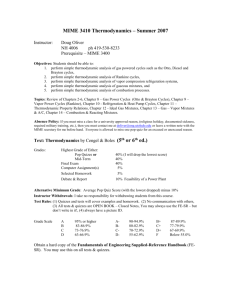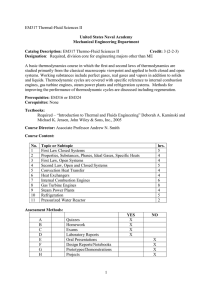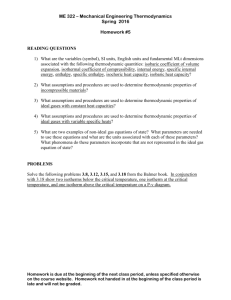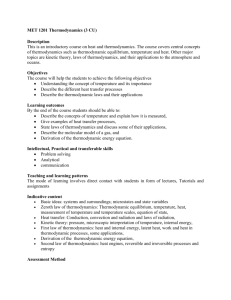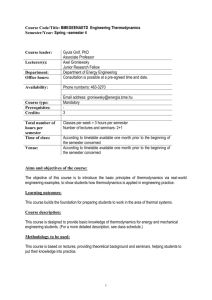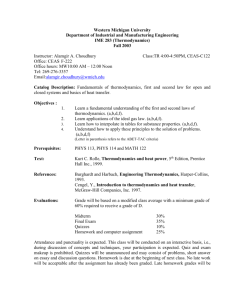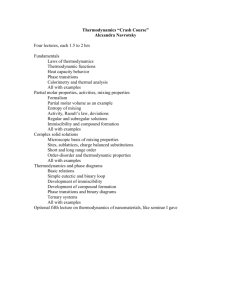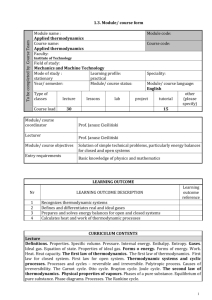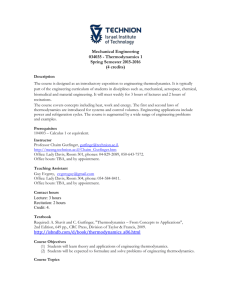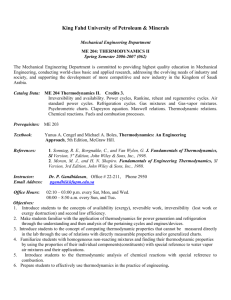ME 321 Engineering Thermodynamics Syllabus - Portland State
advertisement
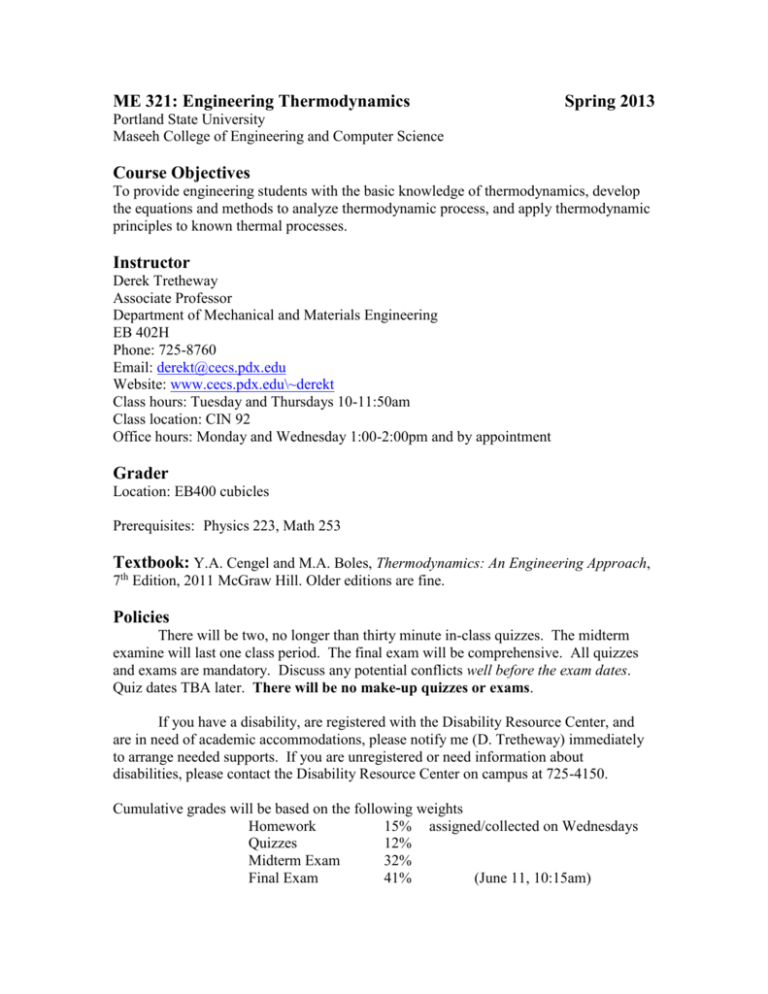
ME 321: Engineering Thermodynamics Spring 2013 Portland State University Maseeh College of Engineering and Computer Science Course Objectives To provide engineering students with the basic knowledge of thermodynamics, develop the equations and methods to analyze thermodynamic process, and apply thermodynamic principles to known thermal processes. Instructor Derek Tretheway Associate Professor Department of Mechanical and Materials Engineering EB 402H Phone: 725-8760 Email: derekt@cecs.pdx.edu Website: www.cecs.pdx.edu\~derekt Class hours: Tuesday and Thursdays 10-11:50am Class location: CIN 92 Office hours: Monday and Wednesday 1:00-2:00pm and by appointment Grader Location: EB400 cubicles Prerequisites: Physics 223, Math 253 Textbook: Y.A. Cengel and M.A. Boles, Thermodynamics: An Engineering Approach, 7th Edition, 2011 McGraw Hill. Older editions are fine. Policies There will be two, no longer than thirty minute in-class quizzes. The midterm examine will last one class period. The final exam will be comprehensive. All quizzes and exams are mandatory. Discuss any potential conflicts well before the exam dates. Quiz dates TBA later. There will be no make-up quizzes or exams. If you have a disability, are registered with the Disability Resource Center, and are in need of academic accommodations, please notify me (D. Tretheway) immediately to arrange needed supports. If you are unregistered or need information about disabilities, please contact the Disability Resource Center on campus at 725-4150. Cumulative grades will be based on the following weights Homework 15% assigned/collected on Wednesdays Quizzes 12% Midterm Exam 32% Final Exam 41% (June 11, 10:15am) Learning Objectives At the end of the term, students taking ME321 should be able to do the following: 1. Explain and properly use thermodynamic definitions, nomenclature, and vocabulary in both a written and spoken context. 2. Write and explain the First and Second Laws of Thermodynamics 3. Solve simple single-answer problems with the First Law applying appropriate assumptions 4. Translate complex word problems into an orderly and logical problem solving format and identify solution strategies. 5. Obtain thermodynamic data necessary to solve thermodynamic problems. Apply appropriate approximations when necessary. 6. Solve problems which have multiple solution strategies and justify the choice of strategy 7. Apply the Second Law to determine the performance limitations of a given thermodynamic system. 8. Solve problems requiring both the First and Second Laws (heat engines, power cycles, refrigeration cycles etc.) 9. Apply thermodynamic concepts to describe the performance of the individual components of an engineering system, e.g. a power plant, a jet engine, etc., and then relate that information to the overall performance of the entire system. ME321 Course Outline (tentative*) Class Date Subject Reading 1 4/2 Overview, problem solving, units Ch. 1 2 4/4 Terminology, nomenclature, Property tables, interpolation Ch. 1, Ch.3 3 4/9 Properties: Phase changes, Ideal Gas, solids, and liquids 3-6 thru 3-11 4 4/11 Energy transfer: forms of energy and exchanges Ch. 2 5 4/16 Energy transfer: mass cons., flow work, control volumes Ch. 4 6 4/18 More First Law 7 4/23 First Law: energy balance, open and closed systems 8 4/25 1st Law: devices, unsteady energy balance, Applications 9 4/30 Applications of 1st Law cont. Intro to the 2nd Law 10 5/2 Engine analysis, measure of performance, midterm review Ch. 6 11 5/7 Midterm Exam 12 5/9 2nd Law: performance measures, reversibility, Carnot cycle 13 5/14 Entropy concept: solids, liquids, gasses, isentropic eff. Ch. 7 14 5/16 Entropy balance: gas power cycles, automotive engines Ch. 9 15 5/21 Gas turbines, jet engines, vapor cycles 16 5/23 Vapor cycles cont. Power plants 17 5/28 Power plants cont. 18 5/30 refrigeration cycles, heat pumps Ch. 11 19 6/4 Maxwell equations Ch. 12 20 6/6 Review Ch. 5 Ch. 10 Additional optional reading: Topics of Special Interest * note: This is a tentative course outline. Lecture topics and reading assignments may vary depending on lecture progress. The midterm date may change! The date will be confirmed by an announcement in lecture. Do not claim that you missed the midterm exam because it did not occur at the date implied by this outline! ME321 Homework Format: 1. Name and date in upper right hand corner on every page. Please staple pages together. 2. Homework assignment number on upper left. 3. Please write legibly in dark pencil or pen. Print (no cursive) with decent size. 4. Identify each problem clearly. 5. Please box the results using proper significant digits and show the units. 6. For solving problems follow the format in the textbook. 7. State the problem (what’s given). 8. State the required results. 9. List the assumptions employed – only state the assumptions that can potentially cause the answer to differ significantly from the real answer. 10. In the analysis, clearly identify what you are doing. Do not string together formulas without connecting them properly with explanation text. Justify the use of formulas. 11. Add comments to results when appropriate. Do the results appear reasonable? Are the assumptions reasonable? Is there additional relevant material not reflected in the analysis?

